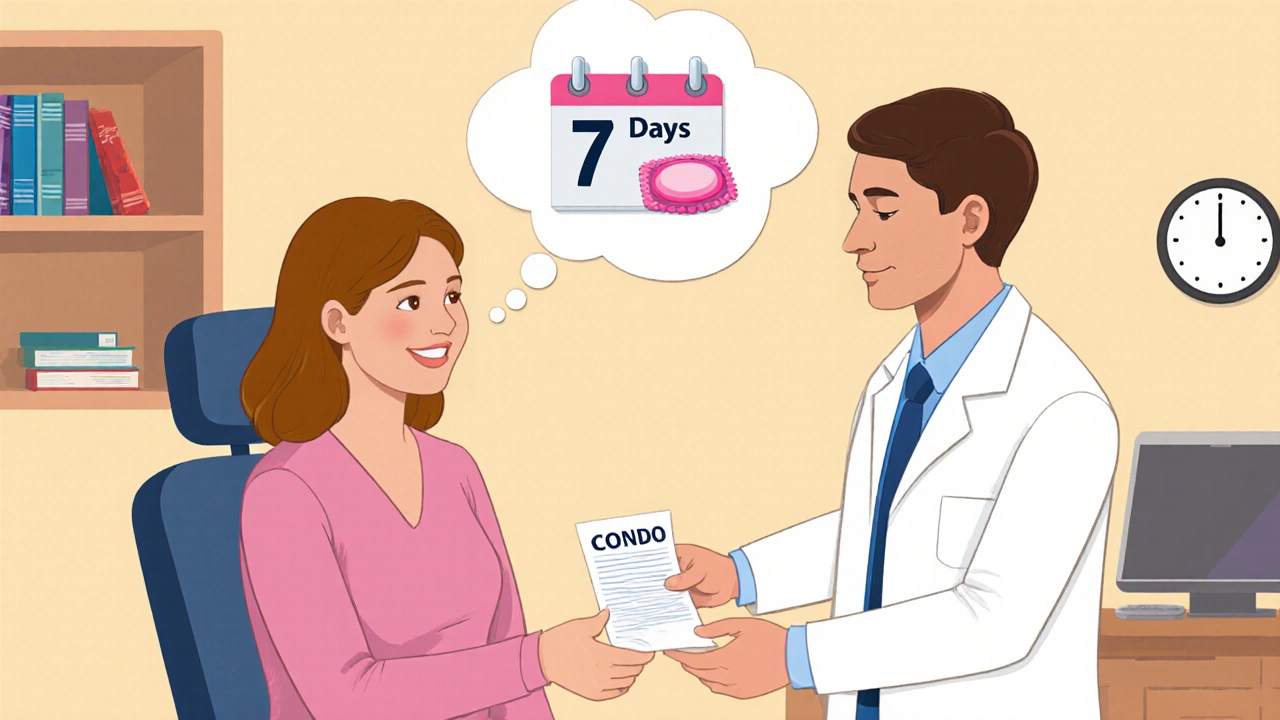Antibiotic Birth Control Interaction Checker
Select an antibiotic to see guidance
Key Takeaways
- Rifampin/Rifabutin: Requires backup birth control during treatment and for 7 days after
- All other antibiotics: CDC, ACOG, and FDA consider them Category 1 (no restriction)
- Guidelines show unnecessary backup method use drops from ~80% when using evidence-based counseling
When you hear "antibiotics" and "the pill," a wave of worry often follows. Does a short course of antibiotics really make birth control ineffective? Below we break down what the science actually proves, which antibiotics matter, and how you can counsel patients without feeding myths.
Antibiotic interaction with oral contraceptive pills is a drug‑drug relationship where a medication used to treat bacterial infections could lower the effectiveness of combined hormonal contraception. While the idea has lingered for decades, today’s evidence points to a single class of antibiotics as the real culprit.Quick Takeaways
- Only rifampin (and, to a lesser extent, rifabutin) consistently reduces the efficacy of combined oral contraceptives.
- Broad‑spectrum antibiotics such as amoxicillin, doxycycline, or azithromycin show no meaningful impact on hormone levels.
- Guidelines from CDC, ACOG, and FDA now list non‑rifamycin antibiotics as Category 1 (no restriction).
- Patients using rifampin should add a backup method for the duration of treatment and for 7 days after the last dose.
- Clear, evidence‑based counseling cuts unnecessary backup‑method use from ~80 % to <20 % without raising pregnancy rates.
What the Evidence Says
A 2018 systematic review that pooled 17 studies and 1,852 women found virtually identical pregnancy rates for those taking non‑rifamycin antibiotics while on the pill (0.69 / 100 woman‑years) and those who did not (0.54 / 100 woman‑years). The difference was not statistically significant (p = 0.57). In contrast, multiple pharmacokinetic trials demonstrate that rifampin cuts ethinylestradiol exposure by 40‑60 % and lowers maximum concentrations by about 30 %.
Rifabutin, a weaker enzyme inducer, reduces ethinylestradiol AUC by roughly 25 %-enough to raise caution but not to mandate a contraindication. All other antibiotics studied-amoxicillin, doxycycline, azithromycin, ceftriaxone-showed either no change or changes that never translated into clinical failure.
How Antibiotics Could Theoretically Affect the Pill
Two mechanisms are often quoted:
- Hepatic enzyme induction. Rifampin stimulates the cytochrome P450 3A4 (CYP3A4) pathway, speeding up metabolism of both ethinylestradiol and progestins. Faster clearance means lower circulating hormone levels and a higher chance of ovulation.
- Disruption of enterohepatic recirculation. The gut flora re‑conjugates estrogen metabolites, allowing them to be reabsorbed. Broad‑spectrum antibiotics could theoretically reduce bacterial deconjugation, decreasing estrogen re‑absorption.
Real‑world studies, however, show that the second mechanism has negligible clinical impact for most antibiotics. Only the potent CYP3A4 inducer rifampin creates a measurable drop in hormone levels.

Which Antibiotics Truly Matter
| Antibiotic | Mechanism of Interaction | Effect on Hormone Levels | Guideline Category (CDC) |
|---|---|---|---|
| Rifampin | Strong CYP3A4 induction | ‑40 % to ‑60 % AUC | 4 - Unacceptable risk |
| Rifabutin | Moderate CYP3A4 induction | ‑25 % AUC | 2 - Potential interaction |
| Azithromycin, Doxycycline, Amoxicillin, etc. | None proven | No clinically relevant change | 1 - No restriction |
The table makes it clear: for everyday antibiotics, the pill remains reliable.
Clinical Guidelines and Recommendations
Major bodies have converged on similar language:
- CDC US Medical Eligibility Criteria (2020) lists rifampin with combined hormonal contraception as Category 4, all other antibiotics as Category 1.
- American College of Obstetricians and Gynecologists (ACOG) Practice Bulletin 206 (2019) states, “Only rifampin has been shown to decrease the effectiveness of combined hormonal contraception.”
- UK Faculty of Sexual & Reproductive Healthcare (2019) declares no evidence of interaction with broad‑spectrum antibiotics.
- European Medicines Agency (2022) updated labeling in the EU to remove non‑specific antibiotic warnings.
In practice, that translates to a simple rule: if a patient is prescribed rifampin (or rifabutin), advise a backup method (condom, diaphragm, or a short‑acting progestin) for the duration of therapy and for 7 days after stopping. For any other antibiotic, no extra contraception is needed.

Practical Advice for Patients and Providers
Here’s a step‑by‑step script you can use in the clinic:
- Ask the patient which antibiotic they are taking.
- If the answer is rifampin (or rifabutin), explain the enzyme‑induction effect in plain language: “It speeds up how quickly your body clears the hormones, so a backup method is safest.”
- Present two backup options (condom + spermicide or a 48‑hour emergency contraceptive plan) and let the patient choose.
- If the antibiotic is anything else, reassure them: “Studies of more than 2,000 women show no increase in pregnancy risk.”
- Document the counseling in the medical record and provide a one‑page handout summarizing the guidance.
Feel free to hand out the quick‑take list above; it reduces anxiety and keeps the conversation focused.
Emerging Research and Future Directions
The NIH‑funded ACILE study (launch 2023) will follow 5,000 OCP users on antibiotics for three years, aiming to capture rare real‑world failures. Meanwhile, personalized medicine is entering the scene: a UCSF pilot is genotyping CYP3A4 variants to flag the few women who might metabolize hormones faster under any enzyme‑inducing drug.
Regulatory momentum is evident. The FDA’s 2022 Draft Guidance urges manufacturers to remove vague “antibiotics may reduce effectiveness” warnings unless supported by Level A evidence. Once the guidance becomes final, package inserts will likely list only rifampin and rifabutin, simplifying pharmacy counseling.
Until those changes are universal, clinicians should stay tuned to updates from ACOG, CDC, and local health departments, especially when new antibiotics (e.g., novel macrolides) receive approval.
Frequently Asked Questions
Does taking amoxicillin while on the pill increase my chance of pregnancy?
No. Large pharmacokinetic studies and real‑world reviews have found no change in hormone levels or pregnancy rates when amoxicillin is taken with combined oral contraceptives.
Why do pharmacists still tell me to use backup contraception with antibiotics?
Many pharmacy guidelines still reflect older teaching that lumped all antibiotics together. Updated evidence‑based protocols are being rolled out, but practice varies widely.
If I’m prescribed rifampin for TB, what backup method should I use?
A reliable barrier method (e.g., condoms) for the whole course and for 7 days after the last rifampin dose works well. Some clinicians also recommend switching to a non‑hormonal method temporarily.
Will a short course of antibiotics (<5 days) affect my pill?
For non‑rifamycin antibiotics, even a 10‑day course shows no impact on hormone levels. Short courses are therefore safe without extra protection.
Are there any new antibiotics on the horizon that could interact with the pill?
Current research focuses on enzyme‑inducing agents. Until a new drug shows strong CYP3A4 induction in human trials, the pill remains reliable.
Bottom line: the myth that “any antibiotic makes the pill fail” is mostly busted. Keep rifampin at the front of your mind, and you’ll guide patients with confidence.


Veronica Appleton
October 24, 2025 AT 18:46The data is clear. Rifampin is the only antibiotic that matters. Most other antibiotics don’t affect the pill. So you can reassure patients that a short course of amoxicillin is fine. Keep using backup only with rifampin.
Zaria Williams
October 27, 2025 AT 01:20Honestly a lot of docs still spred the myth that any antibiotic will mess up the pill. The CDC guidelines are crystal clear that only rifamycin class does that. If you’re on a regular course of doxy or azithro there is no need for extra condoms. I wish more people would read the actual studies instead of relying on old wives tales. So just tell your patients to keep taking their birth control as usual.
Abhinav B.
October 29, 2025 AT 08:53Look the evidence is out there. Rifamoin reduces hormone levels considerably. Other antibiotics have basically no effect on the pill.
Abby W
October 29, 2025 AT 08:55👍 totally get where you’re coming from 🙌 but just a heads up the typo isn’t a big deal – the main point is rifampin is the culprit not the rest.
Lisa Woodcock
October 30, 2025 AT 12:40I hear you and I’m glad you’re pointing out the guidelines. It can be stressful for patients when they hear conflicting info, so clear communication really helps. It’s great to see the evidence being shared in a friendly tone.
Sarah Keller
October 31, 2025 AT 16:26When we examine the relationship between antibiotics and hormonal contraception we quickly discover that the discourse is polluted by decades of myth making. The central fact is that rifampin, a potent enzyme inducer, accelerates the metabolism of estrogen and progestin, thereby reducing plasma concentrations. This reduction is clinically significant and has been demonstrated in multiple pharmacokinetic studies. In contrast, the majority of commonly prescribed antibiotics-penicillins, macrolides, tetracyclines, and fluoroquinolones-lack such inducing properties. Their mechanisms of action target bacterial protein synthesis, cell wall formation, or DNA replication without engaging hepatic cytochrome P450 pathways. Consequently, hormone levels remain stable during treatment with these agents. The CDC, ACOG, and FDA have all converged on this evidence, classifying non‑rifamycin antibiotics as Category 1 for contraceptive use. Practitioners should therefore reserve backup contraception for patients on rifampin or rifabutin and for the treatment window plus seven days thereafter. This recommendation stems from the drug’s half‑life and the time required for enzyme activity to normalize. Over‑cautious backup recommendations for all antibiotics, however, dilute patient confidence and can lead to unnecessary anxiety. Moreover, they place an avoidable burden on individuals who may already be navigating complex medication regimens. By adhering to the evidence base we empower patients with accurate information and reinforce trust in medical guidance. Education should focus on the specific interaction, not a blanket prohibition. Ultimately, the goal is to align clinical practice with the best available data, ensuring safety without compromising autonomy. Let us champion a nuanced understanding that distinguishes rifampin’s unique profile from the benign nature of most other antibiotics.
Grace Silver
November 1, 2025 AT 20:13Great summary.
Clinton Papenfus
November 3, 2025 AT 00:00In light of the comprehensive analysis presented, it is prudent to reaffirm that only rifamycin agents necessitate additional contraceptive measures. The remaining antibiotics are safely compatible with hormonal birth control.
krishna chegireddy
November 4, 2025 AT 03:46Of course the powers that be don’t want you to know that the pharma giants are secretly funding the studies to keep rifampin sales high. It’s all a grand design to keep us guessing.